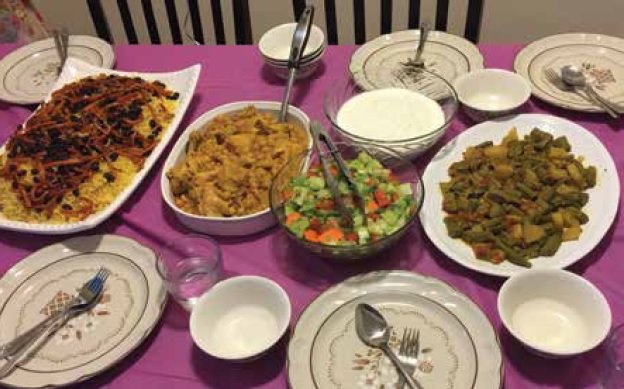The Journey from Stranger to Family
by Frank McCann, CSJP-A
With their lives packed into a few suitcases, the young couple and their one-year old daughter were at the airport for their flight to America when the Taliban launched an attack on the airport in Kabul. After a three-day delay, they finally arrived at Newark Liberty International Airport on October 4, 2017. They were allowed entry to the country despite the “Muslim ban,” because he worked for a contractor who assisted the U.S. military in Kabul. They underwent years of what is known under the current administration as “extreme vetting.” After even more immigration screening, we searched for them in the crowded airport using a poor-quality photo texted to our phones.
“Salaam Aleichem! Welcome to America!”
So began our engagement with this young family over this past year. Pope Francis encourages us to welcome immigrants, to engage with people of another culture, “as an opportunity to build peace.” We were determined to do our part to create a relationship of mutual respect that would counter the rhetoric and policies of the current administration. We are, after all, one human family.
An early decision that would have cultural implications was the decision on where to find an apartment for them to live. Paterson, New Jersey is a low-income city nearby where there are some Afghan residents, restaurants and shops. We invited the family to apartment shop with us explaining the characteristics of various neighborhoods, safety considerations and costs. Eventually we settled on an apartment in Teaneck, a racially and culturally diverse community where our church is located. It would mean fewer Afghan neighbors but would afford more opportunity for volunteers’ support. Happy with their Teaneck home, they have just renewed their lease for another year.
Parish volunteers started teaching English as a second language right away. Three teams were formed to spend time with the family every week. Their efforts continued even when the parents signed up for an ESL course offered by the local community college three nights a week for three hours a night. Volunteers continue to provide transportation to and from the lessons as well as babysitting services.
Their language has come a long way. This week, the now two-year old was counting in English and holding up shapes and calling them by name. The child development specialist who babysat the other night commented on what a blessing it was to see an example of how children develop the same way despite different cultures and languages. We are, after all, one human family.
The lack of English and marketable skills presented challenges for job seeking. The husband wanted to work immediately on arrival, but official paperwork would take a few weeks. He found employment six weeks after arrival in a commercial kitchen. His shy smile and work ethic made him a valued employee. Raises have improved his income level, but the apartment is still unaffordable. Affordable is defined as being 30% of income or less. They are not alone; 19 million renters in the US pay an unsustainable 50% or more of their income for housing.
Our family grew fearful after about seven or eight months. Catholic Charites was committed to help for six months, and help stopped abruptly at the six-month mark, catching the family off-guard. Shortly thereafter, they were cut off from receiving TANF (welfare) and SNAP (food stamps) benefits because, according to program rules, the husband was earning too much for the family to qualify. His work was steady but would he need a second job? Culturally, it would be inappropriate for the mother to place her daughter in child care to work. It would also be a blow to the father’s honor. Because they were told from the beginning our church had committed to subsidize the rent for a year, the family began to worry that we would soon abandon them too. We assured them otherwise and obtained a commitment from the pastor to continue to assist with rent.
As coordinator, I would see to the schedule of ESL classes, trips to food shopping, visits to doctors, etc. I came to realize these needs were all being taken care of naturally through the relationships that had been built over 10 months. Our continued daily involvement has moved far beyond being volunteers for a parish program to a genuine friendship.
The former volunteers continually comment on how the family could not be more appreciative. The family calls to say thank you, or to inquire about an ill family member. They are overwhelmed by the time we spend with them, driving, babysitting, shopping and they constantly want to show their appreciation. Groups have been invited to dinner where we are served many courses of delicious and plentiful Afghan dishes. Recently, we planned an informal second birthday party for the baby to be held in the park. It rained, so instead we were invited to the apartment where we were served a fabulous meal. They teach us about hospitality that is so deeply ingrained in the Afghan culture they share with us.
Strangers a year ago, we are now one family.
This article appeared in the Autumn 2018 issue of Living Peace.

